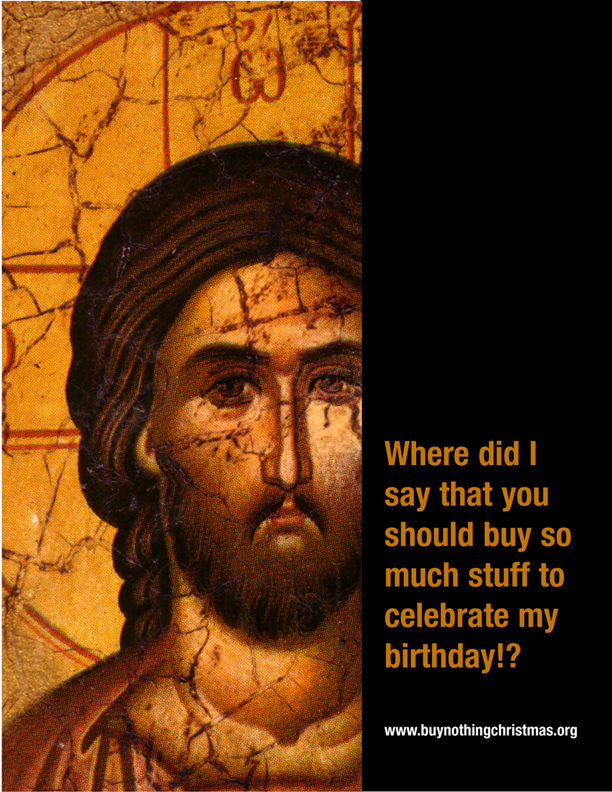
Since their arrival in North America in the seventeenth century, Mennonites have been known for their love of a simple lifestyle. In 2001 a number of Canadian Mennonites combined that anticonsumerism with a Marxist perspective on the economy to produce the Buy Nothing Christmas movement, which was inspired by Adbusters’ “Buy Nothing Day,” the Center for a New American Dream, and McKibben’s Hundred Dollar Christmas. Claiming not to wish to abolish Christmas, they aim to “offer a prophetic ‘no’ to the patterns of over-consumption of middle-class North Americans.” Much of their material is phrased in religious terms—a Byzantine icon of Christ with the slogan “Where did I say that you should buy so much stuff to celebrate my birthday?”; a reference to “Mary, the unwed mother of Jesus [who] went against the grain”; a play based on the biblical characters Mary and Martha; and a “Buy Nothing Christmas” liturgy. The group’s founder used religious imagery in a piece for the Washington Post:
To me, Black Friday is essentially our version of a religious pilgrimage. We worship in the mega stores, make schedules around holi- day deals, display allegiance to brands and low prices, offer tithes to the cashiers. Masses of people swarm the stores with hype and fervor. But where’s the meaning? The deep meaning?
We know we’re placating the gods. Which is why Christians need to pull back from the biggest shopping day of the year. Retail products occupy too much space in our homes and hearts.
It’s not that there’s something more important than the economy, it’s that the economy needs to be re-fashioned. Jesus acknowledged wealth and power (give to Caesar what is Caesar’s) and sought to undermine it (woe to the rich, blessed are the poor).
By resisting the impulse to shop for deals on Black Friday we stand at the feet of the retail titans and, with the power of non- cooperation, we challenge the injustices of poor labor conditions, exploitative hiring practices, unfair monopolies, and irresponsible resource extraction.
The Buy Nothing Christmas movement has, inevitably, produced a musical play, A Christmas Karl, based on Dickens’s Christmas Carol: “a tender tale of commercialism, compassion and fruitcake”; they make available gift cards that offer a service or loving gesture instead of a retail product. Their most effective way of gleaning media attention is their street theatre and the cheeky invasions of shopping precincts during the Christmas season, singing parodies of Christmas songs and getting evicted by mall security.
The tv’s on, are you watching?
Another product that they’re hawking
one more thing that you need, to make life complete
Welcome to Consumer Wonderland.
In the stores, you will hear it
“Pricey gifts, show holiday spirit”
That’s what they call it, to get to your wallet,
Welcome to Consumer Wonderland.
At the mall, we can go out shopping
and buy lots of stuff we can’t afford
we’ll have lots of fun with our new toys
until we realize that we’re still bored.
Unlike earlier Protestant movements that sought to purge Christmas celebrations of excess, the Buy Nothing Christmas movement is avowedly anticapitalist. By attacking Christmas spending, they hope to bring capitalism to its knees. In reply to the question “If we all buy nothing this Christmas, won’t a lot of people lose their jobs?” their website claimed:
Yes, and now we’re getting close to the core reasons for why Buy Nothing Christmas is necessary in the first place: our economy is based on a consumer driven capitalism. And because it’s the only economy we have right now, if we stop shopping we stop the economy…. But the pitfalls of our current economic system (we work too hard to save money to buy things we don’t really need, and we endorse a standard of living that reinforces the gap between the rich and poor and ruins the earth) are simply untenable. Once we finally see the retail sector shrivel…we can redirect our efforts to cleaning up our mess and developing more sustainable activities (how we build our homes, transport ourselves, manufacture clothes, and spend our leisure time).